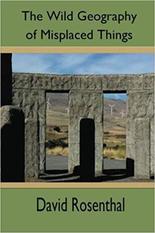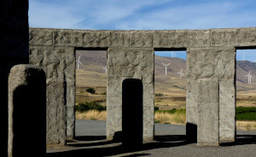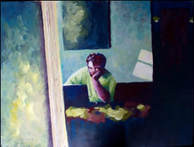
The Wild Geography of Misplaced Things
David Rosenthal's poetry collection from White Violet Press
David Rosenthal's poetry collection from White Violet Press
|
PILES OF THINGS
I don’t put things away where they belong -- I set them down on tabletops and shelves where piles accumulate. The piles themselves are missing items put back in the wrong collections, redistributed among the wild geography of misplaced things that forms around me in concentric rings of monuments to what does not belong. And just beyond these monumental rings, there is another ring of vacant places, longing to greet the repatriated faces of all the never quite forgotten things that once conformed exactly to the spaces settled now by dust and fading traces. originally appeared in Measure, and subsequently in The HyperTexts |
|
"David Rosenthal’s The Wild Geography of Misplaced Things takes us beyond the established borders of our ordinary lives into memory and its defiance of time, a place where things that may have been misplaced suddenly reappear and reveal their true nature, until we realize that nothing in Rosenthal’s world that truly matters is misplaced or forgotten. Just as 'petals from a plum tree . . . / let their branches go / to take their chances on the air,' Rosenthal lets go of safety and security to take his chances again and again on song. It helps that rhythm seems to come as naturally to him as breathing. It helps that he knows the value of laughter and the dangers of too much restriction — he must be a wonderful teacher, given that he knows how wrong it is to force children into such regimentation that we 'have them sit in squares . . . [and] turn their searching eyes to stares.' It helps that he has a boundless capacity for tenderness, one that is never sentimental and can be quite erotic, as in the delicately achieved 'Braille.' It helps that his clarity of purpose is never polemical or dogmatic, even when it is hard-hitting: in what is really an elegy, Rosenthal tells us the swings of a playground abandoned in favor of a parking lot will fall into disuse 'unless the wind brings ghosts to play.' And it helps that Rosenthal knows what he knows — 'There is music in the woods tonight.' For woods, read wild geography. Rosenthal makes the listening as instructive as it is delightful."
— Lynne Knight, Again, The Book of Common Betrayals, The Persistence of Longing |
FROM A WINDOW
It isn't snow -- the petals from the blossoms of a nearby tree have harvested without a plum, to gather on the ground below. Around here we don't often see the strange and lovely, lonely glow of Winter's fallow imagery. But then again, this isn't snow -- and if it were, it wouldn't be: it always seems to disappear before it has a chance to grow the way I see it growing here. But I forget, this isn't snow -- the petals from a plum tree near the fence have let their branches go to take their chances on the air; and nearly frozen from the flow, the tree itself is almost bare, except a lightly dusted layer of crystal flakes that aren't snow. originally appeared in Pivot, and subsequently in The HyperTexts |
|
"How lucky David Rosenthal's students are! They have a teacher whose perception of the physical world is as fresh, genuine and immediate as their own, whose language is as bravely, unashamedly direct, and whose desire to play — with words, images, ideas, experiences and things — is apparently as inexhaustible. And they're luckier still in the extras he brings them: the adult capacity to value all of those important and impermanent blessings, the poet's urge to preserve them in poems, and the wisdom to know that nothing else can. Come to think of it, his readers are even luckier — all of them, at any age."
— Rhina P. Espaillat, Where Horizons Go, Rehearsing Absence, Her Place in These Designs |
TEMPORARY PORTABLES
The portables will stay in place another temporary year. Balls will flatten in the space between them, but won’t disappear behind the full-height, chain-link fence cordoning off the two-foot gap that never made an inch of sense, except to form a cunning trap to hold the spoils of errant kicks indefinitely on display: a diorama that depicts deflated artifacts of play. originally appeared in Birmingham Poetry Review |
Entire contents of this site copyright (c) 2010-2024 David Rosenthal. All rights reserved.



